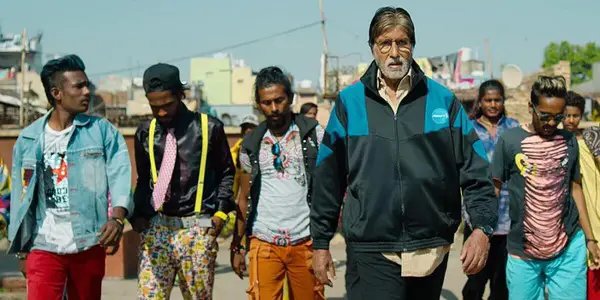JHUND: Soccer With a Dash of Social Reform

Soham Gadre is a writer/filmmaker in the Washington D.C. area.…
Every time an independent filmmaker who has something meaningful to say and the talent to say it with confidence gets swept up by the mainstream industry, it’s always bittersweet. I’m happy that a fellow Marathi filmmaker has found footing in the Indian mainstream the way that Nagraj Manjule has. His debut film Fandry (2013) was one of the most remarkable rural stories of caste discrimination I’ve seen this century and it bubbles and boils to an explosion in the best way.

All of Manjule’s movies are about underdogs and they’re all about the roadblocks and violence that keep people suppressed. While Fandry and Sairat (2016) are brutally honest depictions of threats to the underprivileged, his latest film and first Bollywood movie, Jhund, is an example of a tiger having its claws blunted.
Exciting Sports Choreography
Nitesh Tiwari’s Dangal (2018) perfected the tension and thrilling ballet of athleticism in sports in Hindi cinema and Jhund continues the aesthetic development of sports sequences with some fantastic editing and choreography in its soccer matches. In its best moments, it’s a pure sports film that explores the way that sports build community and character, especially amongst youth. In its waning moments, it tries to build social commentary on the bureaucratic obstacles and social issues of impoverished communities in India. Jhund is based on the true story of Vijay Barse (Amitabh Bachchan), a social worker who founded Slum Soccer. It’s a ripe true story for a commentary on how sports and social programs can help those in underprivileged areas. But its identification of social issues comes in the classical way that many in the middle classes and upper classes look at the underprivileged – a product of their environments, but that environment is of course self-contained and self-symptomatic. There can’t possibly be any external forces that keep it this way.
Hamster-Wheel of Bureaucracy
There are plenty of scenes of Barse making his case to university deans, political leaders, and even the police to give his kids a chance. But they reiterate the same arguments and the film’s structure and consistently puts up identical roadblocks to each new level of success that Barse wants to achieve. This may be realistic – a depiction of how bureaucracy is mundane hamster wheel of the same arguments over and over – but it elongates the film unnecessarily and turns it into a tedious cyclical romp.

We are left wondering each time when we’ll finally be able to see them play soccer again. Interspersed in this narrative is Don (Ankush Gedam) who is making money on the side doing petty crimes and robberies. The movie really picks up when his criminal record catches up to him and comes into a crossfire with his success as a soccer player.
Conclusion
Jhund, in the end, relies a lot on well-worn narrative twists but its characters are enthralling enough to keep the audience invested. The film’s use of non-actors adds an extra dimension to the authenticity of the caste and class differences discussed in the movie. If its socio-politics are very skin-deep and its narrative tends to stumble along its path, one can at least take solace in being able to watch some riveting characters taking on the social ladder that tries to keep them down and make a name for themselves. Nagraj Manjule’s more confrontational work Fandry is well-worth seeking out because it’s decidedly better than Jhund, but for a mainstream breakout film, Manjule creates something that has both a heart and mind behind it.
Jhund released in theaters March 4th, 2022
Watch Jhund
Does content like this matter to you?
Become a Member and support film journalism. Unlock access to all of Film Inquiry`s great articles. Join a community of like-minded readers who are passionate about cinema - get access to our private members Network, give back to independent filmmakers, and more.
Soham Gadre is a writer/filmmaker in the Washington D.C. area. He has written for Hyperallergic, MUBI Notebook, Popula, Vague Visages, and Bustle among others. He also works full-time for an environmental non-profit and is a screener for the Environmental Film Festival. Outside of film, he is a Chicago Bulls fan and frequenter of gastropubs.













